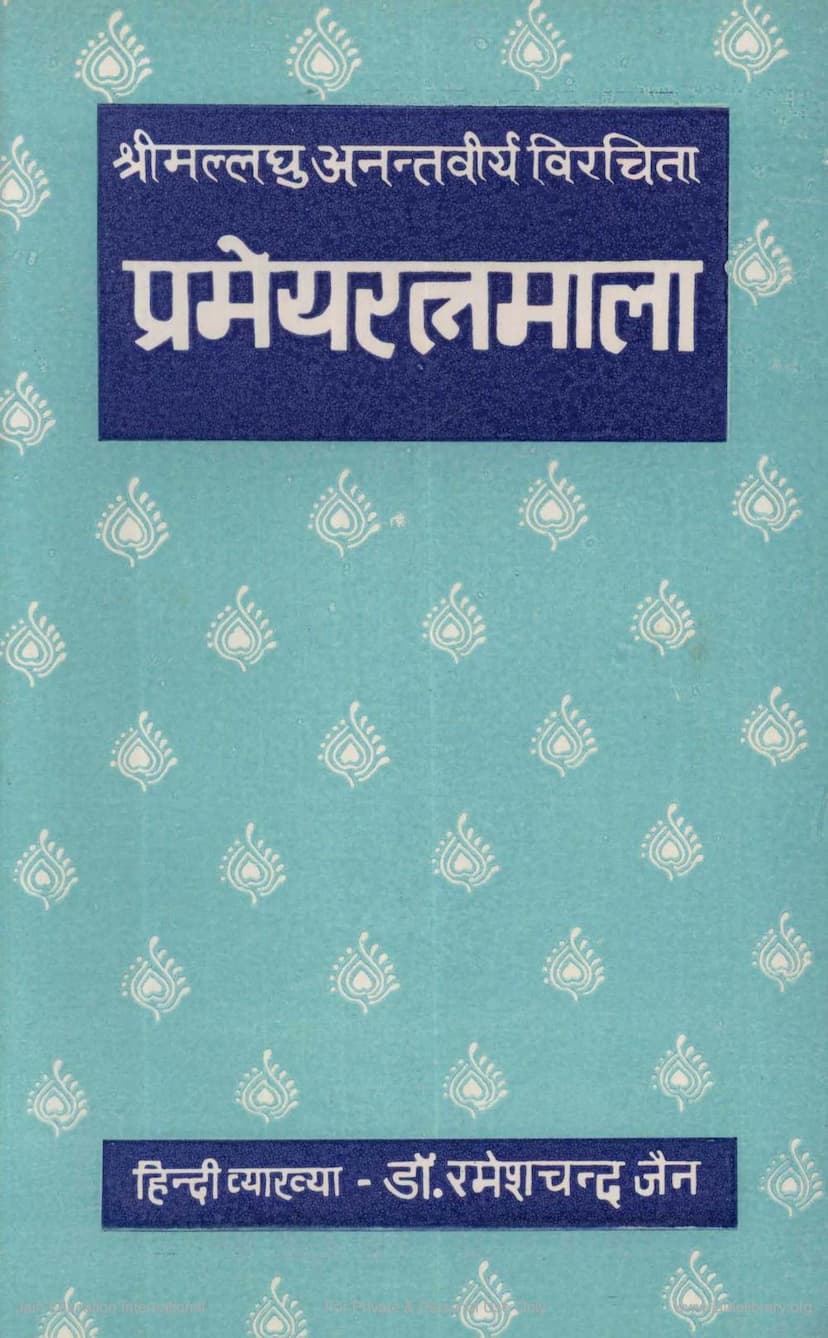Prameyratnamala
Added to library: September 2, 2025

Summary
Here's a comprehensive summary of the Jain text "Prameyaratnamala" by Shrimallaghu Anantvirya, with a Hindi commentary by Rameshchandra Jain, based on the provided catalog link and page content:
Book Title: Prameyaratnamala (प्रमेयरत्नमाला) Original Author: Shrimallaghu Anantvirya (श्रीमल्लघु अनन्तवीर्य) Commentator: Dr. Rameshchandra Jain (डॉ. रमेशचन्द्र जैन) Publisher: Bharat Varshiya Anekant Vidwat Parishad (भारतवर्षीय अनेकान्त विद्वत् परिषद्)
Overall Purpose and Context:
"Prameyaratnamala" is a foundational text in Jain epistemology and logic. It serves as a commentary, likely on an earlier work, explaining and defending the core principles of Jain philosophy, particularly regarding valid knowledge (pramana) and the nature of reality. The commentary by Dr. Rameshchandra Jain aims to make the philosophical arguments accessible through a Hindi explanation, contributing to the preservation and dissemination of Jain knowledge. The publication is linked to the Diamond Jubilee celebrations of Acharya Shri Vimal Sagarji Maharaj, highlighting its significance within the contemporary Jain tradition.
Key Themes and Content:
The text delves into the complex philosophical discourse surrounding Pramana (Valid Knowledge), a central tenet of Jainism. It systematically discusses:
-
The Nature of Pramana: The text begins by defining Pramana as knowledge that is unfailing, insightful, and capable of clarifying reality. It emphasizes that true knowledge leads to the cessation of ignorance and guides one towards beneficial actions and the avoidance of harmful ones.
-
Divergent Philosophical Views: A significant portion of the text is dedicated to critically examining and refuting the epistemological and metaphysical views of other Indian philosophical schools, including:
- Buddhism (Saugata): The text engages extensively with Buddhist arguments, particularly from Dignaga and Dharmakirti, concerning the validity of perception (pratyaksha) versus inference (anumana), the nature of momentariness (kshanabhanga), emptiness (shunyata), and the concept of self-cognition (svasamvedana).
- Nyaya-Vaisheshika (Yaugata): It addresses their views on pratyaksha, anumana, upamana, and shabda pramāṇas, as well as concepts like God (Ishvara), samavaya (inherence), and the nature of substances.
- Mimamsa (Bhaatta and Prabhakara): The text discusses their emphasis on Vedic authority, ritualistic actions, and their specific interpretations of pramana.
- Samkhya: It scrutinizes their dualistic system of Prakriti and Purusha, the concept of the three gunas, and the nature of evolution (parinama).
- Charvaka (Lokayata): It refutes their materialistic and empiricist stance, which prioritizes perception as the sole valid means of knowledge.
-
Jain Epistemology (Syadvada and Nayas): While primarily engaging with other schools, the text implicitly or explicitly upholds the Jain perspective, which is characterized by:
- Anekantavada (Non-one-sidedness): The underlying principle of Jainism, which asserts that reality has multiple facets, is crucial for understanding the critique of exclusive or one-sided claims made by other philosophies.
- Syadvada (Conditional Predication): The theory of conditional predication, which allows for multiple, seemingly contradictory, viewpoints on reality, is a fundamental tool used implicitly to navigate and synthesize different philosophical positions.
- Nayas (Standpoints): The text likely explains the importance of different standpoints (like the material, substantial, substantial-cum-modal, or modal standpoints) in understanding reality, a concept central to Jain logic.
-
Pramanas and Pramanabhasas:
- Pramanas: The text elaborates on the nature, classification, subject matter (vishaya), and fruit (phala) of valid means of knowledge, primarily focusing on perception (pratyaksha) and inference (anumana) as understood within Jainism. It may also discuss other pramāṇas like testimony (shabda) and memory (smriti) within its framework.
- Pramanabhasas (Fallacious Cognitions): A significant portion is dedicated to identifying and refuting fallacious cognitions that mimic valid knowledge. This includes discussing various types of errors arising from faulty perception, inference, and misinterpretations.
-
Structure and Argumentation: The text is structured methodically, often presenting a philosophical position from another school, dissecting its arguments, and then offering a Jain counter-argument supported by logic and principles derived from Jain scriptures. The commentary by Dr. Jain likely clarifies these intricate logical steps.
Significance:
- Preservation of Jain Philosophy: "Prameyaratnamala" is vital for understanding the sophisticated logical framework of Jainism and its engagement with broader Indian philosophical traditions.
- Epistemological Depth: It offers a deep dive into the Jain theory of knowledge, which is crucial for ethical and spiritual understanding in Jainism.
- Intellectual Heritage: The text represents the intellectual prowess of Jain scholars in engaging in rigorous debate and establishing their philosophical positions.
- Commemorative Publication: Its publication during the Diamond Jubilee of Acharya Vimal Sagarji Maharaj signifies its contemporary relevance and the ongoing efforts to promote Jain learning.
In essence, "Prameyaratnamala," as explained by Dr. Rameshchandra Jain, is a comprehensive treatise on Jain epistemology, meticulously refuting opposing philosophical viewpoints and firmly establishing the validity of Jain logic and its understanding of reality, all within the context of promoting spiritual knowledge.